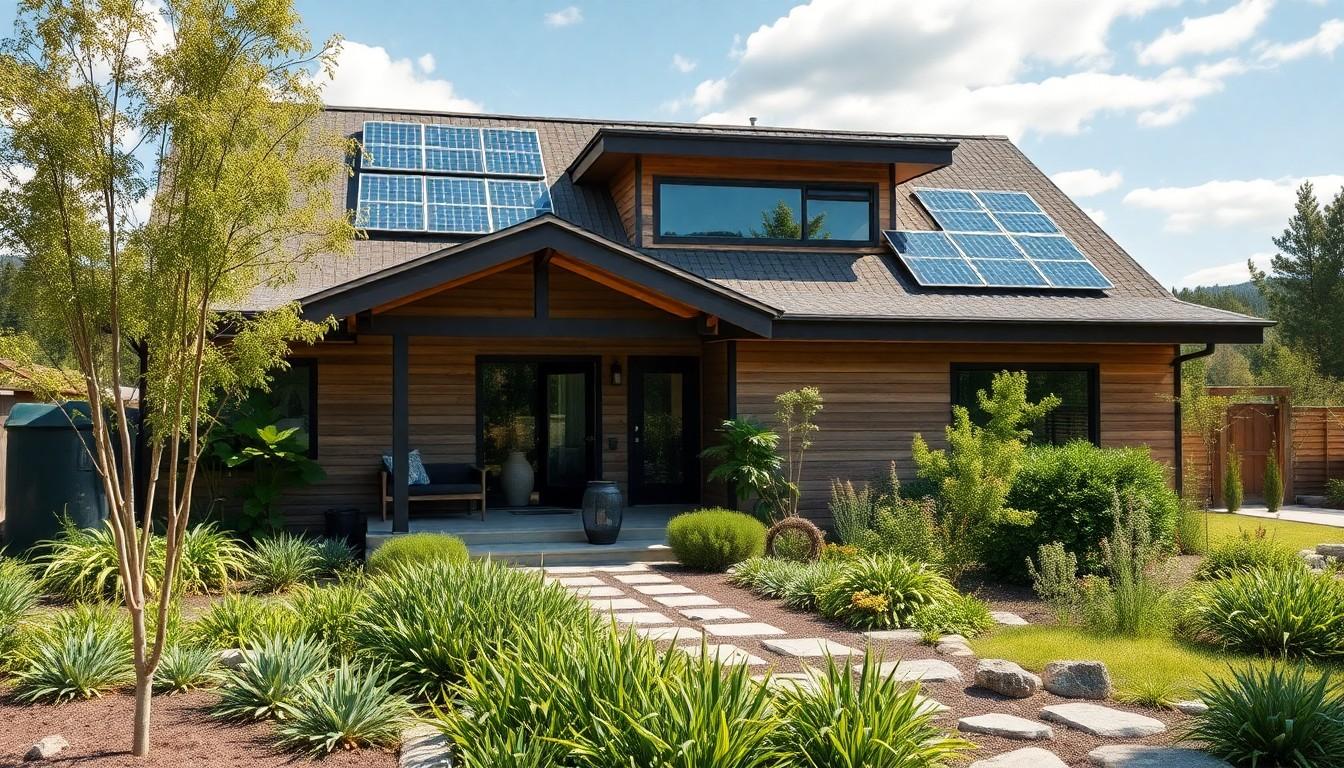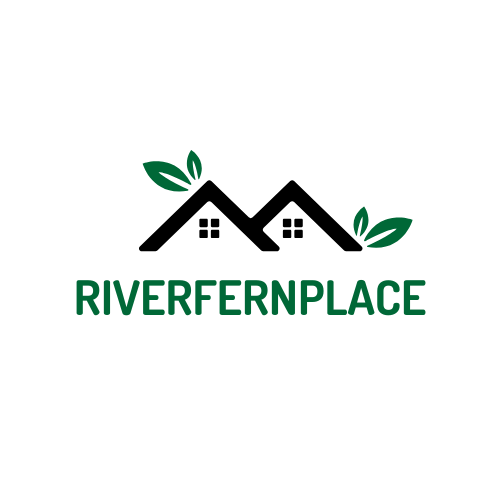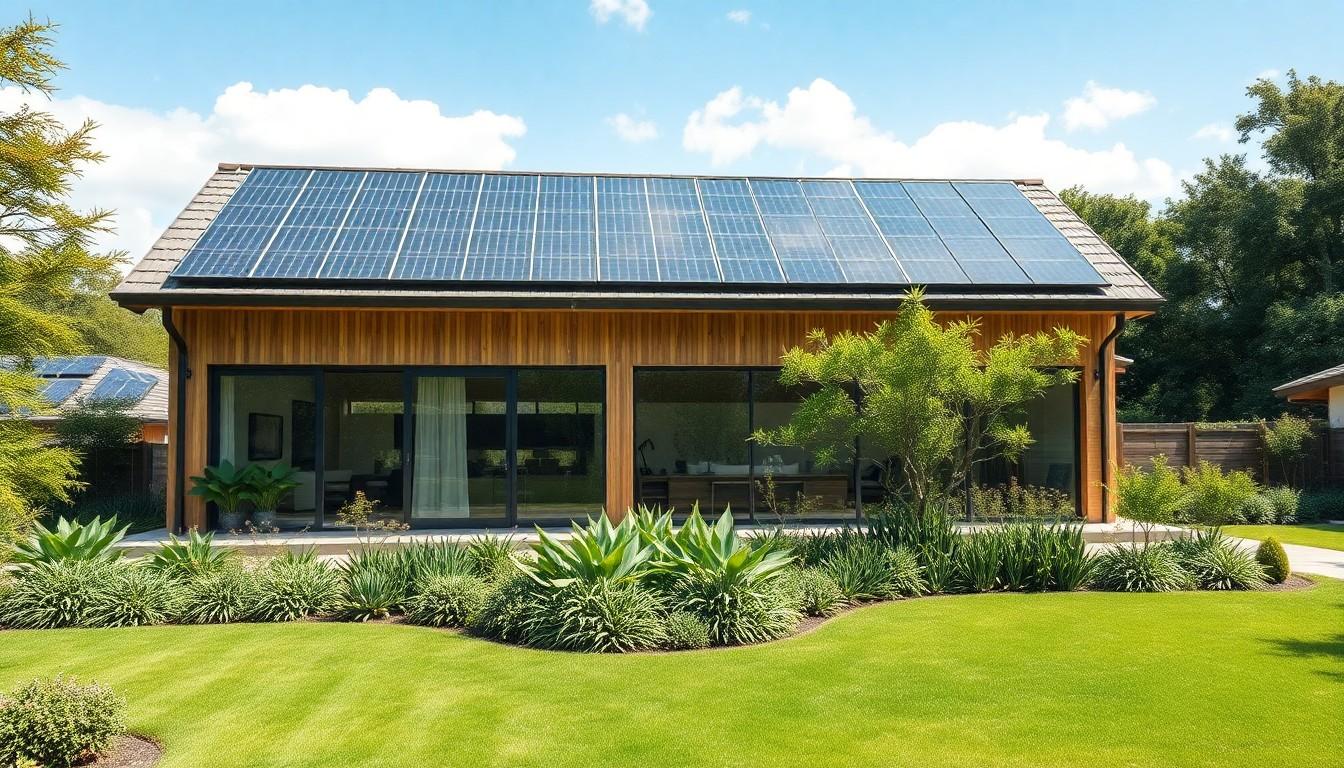Imagine waking up in a home that not only feels good but does good too. An eco-friendly home isn’t just a trend; it’s a lifestyle choice that benefits the planet and your wallet. With energy-efficient appliances and sustainable materials, these homes are like the superheroes of real estate—saving the environment while saving you money on utility bills.
Eco Friendly Home for Sale
Eco-friendly homes prioritize sustainability, energy efficiency, and minimal environmental impact. These homes combine innovative design and smart technology to create healthier living spaces.
What Makes a Home Eco Friendly?
Energy-efficient appliances significantly reduce electricity use. Sustainable materials like bamboo or recycled steel contribute to lower environmental footprints. Proper insulation enhances temperature control, diminishing reliance on heating and cooling systems. Solar panels generate renewable energy, further supporting eco-friendly living. Rainwater harvesting systems collect and reuse water for landscaping or other non-potable needs.
Benefits of Eco Friendly Living
Lower utility bills result from reduced energy and water consumption. Increased indoor air quality supports better health for occupants. These homes often receive higher market values due to growing buyer preferences. Reduced environmental impact contributes to biodiversity and conservation efforts. Incentives, such as tax deductions or rebates, further encourage eco-friendly home investment.
Features of Eco Friendly Homes for Sale

Eco-friendly homes feature a range of attributes that enhance sustainability and overall living quality. These homes combine smart technology with innovative designs to create healthier environments.
Sustainable Materials and Construction
Sustainable materials form the backbone of eco-friendly homes. Bamboo offers strength and rapid growth, making it a popular choice for flooring and cabinetry. Recycled steel provides durability while minimizing waste. Locally sourced materials reduce transportation emissions and support local economies. Additionally, low-VOC paints and finishes improve indoor air quality by limiting harmful emissions. Using reclaimed wood enhances unique aesthetics while promoting environmental responsibility.
Energy Efficiency Features
Energy efficiency features play a critical role in eco-friendly homes. Energy-efficient appliances significantly lower electricity consumption, making everyday tasks cheaper and environmentally friendly. Proper insulation minimizes heat loss, enhancing comfort during varying weather conditions. Solar panels harness renewable energy, reducing reliance on fossil fuels and lowering utility bills. Smart thermostats optimize energy use by adjusting heating and cooling based on occupancy patterns. These combined features contribute to long-term savings and environmental sustainability.
Water Conservation Solutions
Water conservation solutions are essential in eco-friendly homes. Rainwater harvesting systems collect and store rainwater for irrigation and non-potable uses. Low-flow fixtures reduce water consumption in faucets, showers, and toilets, promoting responsible usage without sacrificing performance. Native landscaping minimizes the need for irrigation by using plants well-adapted to local climates. Greywater systems recycle water from sinks and washing machines for irrigation purposes. These strategies significantly reduce water waste and support sustainable living practices.
Popular Eco Friendly Home Designs
Eco-friendly home designs encompass various architectural styles that prioritize sustainability and energy efficiency. Many homeowners seek these designs for their aesthetic and environmental benefits.
Modern Eco Friendly Architectural Styles
Contemporary eco-friendly homes often feature open floor plans that enhance natural light and airflow. Roofs equipped with green materials, such as living plants, significantly improve insulation. Large windows maximize sunlight and minimize reliance on artificial lighting. Use of energy-efficient systems, including solar panels, reduces overall energy consumption. Innovative use of recycled materials in construction adds both sustainability and character to the design. Builders frequently incorporate rainwater harvesting systems, which facilitate responsible water usage, further underscoring environmental stewardship.
Tiny Homes and Their Environmental Impact
Tiny homes emphasize minimalist living while promoting eco-consciousness. Typically ranging from 100 to 400 square feet, these structures require fewer materials and resources in construction. Lower square footage translates directly to reduced energy demands, contributing to lower utility costs. Many tiny homes utilize mobile designs, allowing for sustainable living in diverse locations. Compact spaces encourage resourcefulness, leading to less waste and a lighter ecological footprint. Furthermore, homeowners often incorporate eco-friendly features, such as composting toilets and solar energy systems, into their designs.
Where to Find Eco Friendly Homes for Sale
Finding eco-friendly homes requires targeted approaches. Homebuyers can explore various options, including online platforms and local agents specializing in green properties.
Online Real Estate Platforms
Numerous online real estate platforms list eco-friendly homes for sale. Websites like Zillow, Realtor.com, and EcoBroker allow users to filter listings based on sustainability features. Buyers can search specifically for homes with energy efficiency ratings and green certifications. Detailed descriptions showcase solar panels, energy-efficient appliances, and sustainable materials. Interactive maps help prospective buyers locate eco-friendly neighborhoods, facilitating informed decisions. User-friendly interfaces allow for easy access to key information, streamlining the home search process.
Local Real Estate Agents Specializing in Green Homes
Experienced local real estate agents can provide valuable insights into eco-friendly properties. Agents specializing in sustainability understand the unique features and benefits of these homes. They’ve access to exclusive listings that may not appear online. Buyers receive personalized advice, including information about local green building programs and incentives. Agents often have connections with builders focused on eco-friendly construction, leading to potential new home opportunities. Their expertise ensures that clients find homes aligned with their values and sustainability goals.
Financing Options for Eco Friendly Homes
Financing eco-friendly homes becomes easier with several specialized options available. Buyers interested in sustainable living often seek tailored financial solutions that align with their eco-conscious values.
Green Mortgages
Green mortgages offer better terms for energy-efficient homes. They often include higher borrowing limits due to anticipated savings on utility bills. Lenders may provide lower interest rates and reduced closing costs for properties with green certifications. Programs like Fannie Mae’s HomeStyle Energy program allow borrowers to finance energy-efficient upgrades within their mortgage. Homebuyers benefit from improved monthly payments and lower long-term costs.
Incentives and Tax Credits
Incentives and tax credits enhance the financial appeal of eco-friendly homes. Many states offer rebates for solar panel installations or energy-efficient appliances. Homeowners may claim federal tax credits for certain renewable energy installations, such as geothermal heat pumps. Various local governments provide grants or low-interest loans to encourage sustainable building practices. Financial benefits motivate more buyers to invest in environmentally friendly properties.
Make a Positive Impact
Investing in an eco-friendly home is more than just a real estate choice; it’s a commitment to a sustainable future. These homes not only provide significant savings on utility bills but also contribute to a healthier living environment. With innovative designs and modern technology, eco-friendly properties are becoming increasingly appealing to conscious buyers.
As the demand for sustainable living grows, so does the availability of eco-friendly homes on the market. Homebuyers can take advantage of various resources to find the perfect property that aligns with their values. By choosing an eco-friendly home, individuals can make a positive impact on both their finances and the planet.

